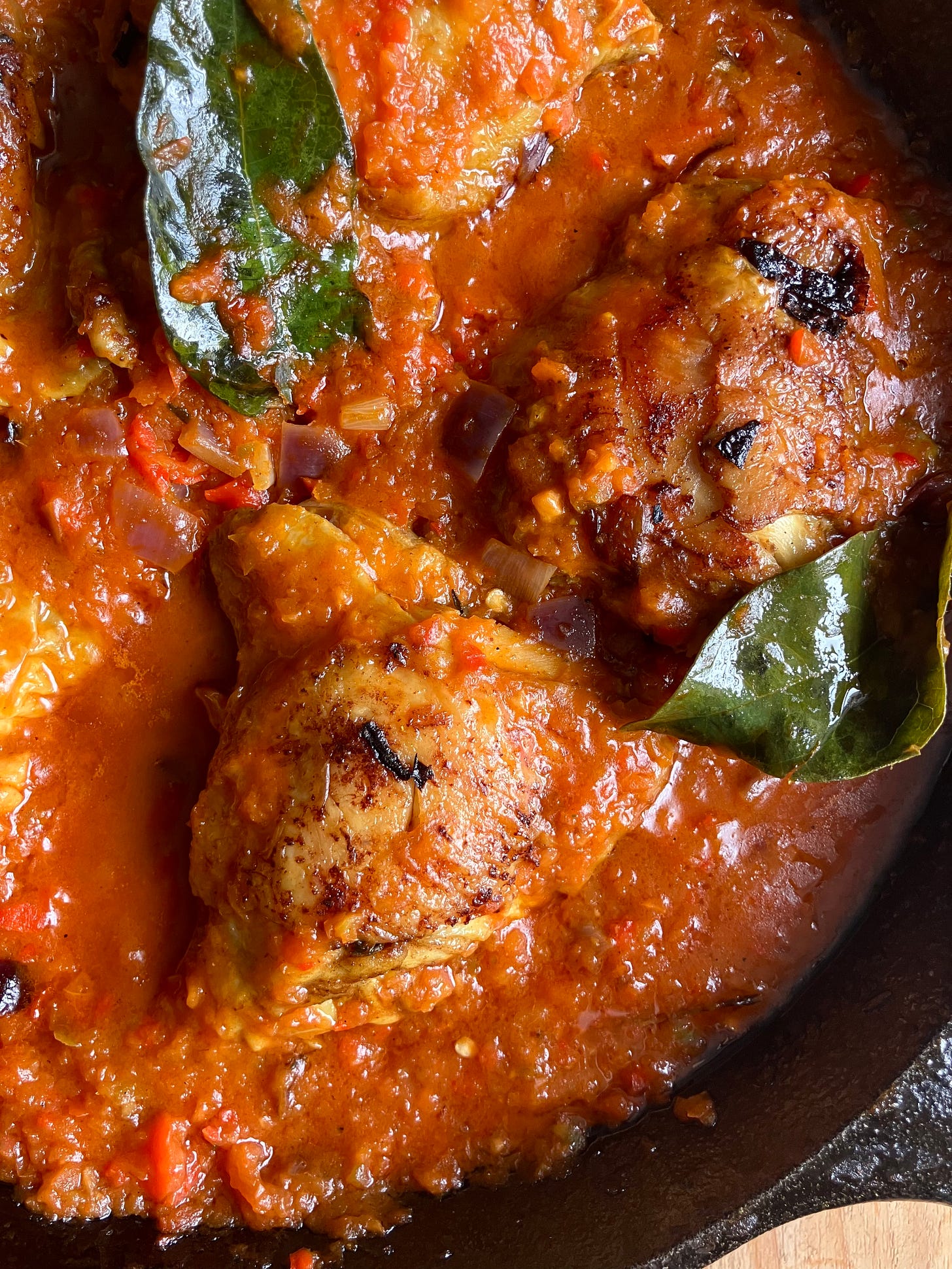When Life Gives you Pawpaw
An essay on tomato shortages in Nigeria, and a recipe for a pawpaw stew with chicken. Words by Tracy Egbele. Photographs by Georgia Rudd.
Good morning, and welcome to Vittles Recipes! Today, Tracy Egbele writes about how tomato shortages in Nigeria have necessitated embracing substitutions for beloved staples, and shares a recipe for pawpaw stew born from experiments in the kitchen.
Last week, we released a call for pitches for Issue 2 of our print magazine, which has the theme ‘Bad Food’. We are open for pitches for Issue 2 until Friday 30th May.
Meanwhile, Issue 1 is available for order on our website. If you would like to stock it at your shop or restaurant, please order via our distributor Antenne Books by emailing maxine@antennebooks.com and mia@antennebooks.com.
When Life Gives You Pawpaw
'‘Food is a way of adapting, of showing tenacity.’
What do you cook when your kitchen staple is missing? This question has increasingly been faced in Nigeria (especially in the Southern regions) over the past fifteen years as tomato harvests have declined. This shortage has largely been driven by the challenges of cultivating tomatoes during the rainy season (May–September), with open farms struggling to withstand the rains, and is compounded by other factors, such as poor transportation and storage and infrastructure. Roads that are already in disrepair become even more difficult to travel at this time of year, slowing delivery and raising costs.
Last year, the tomato scarcity was the worst I’d ever experienced, with tomatoes nearly impossible to find across Nigeria. There were truck breakdowns that left tomatoes left rotting on roadsides, and a rise in the prevalence of crop-destroying pests, especially Tuta absoluta (nicknamed the tomato Ebola), which has wreaked havoc on farms. As a result, many families were left looking for alternatives to cook everyday foods, especially Nigerian stews, in which tomato is a key ingredient (along with fresh peppers and onions). These stews are near-compulsory on Sundays in most homes, and are often prepared in large batches, portioned into containers, and frozen for later use.
As a result, I turned to a stew recipe first cooked by my mother back in 2010, during one of Nigeria’s early tomato shortages. She came up with it after a trip to the market where the few tomatoes that were on sale were barely ripe and wildly expensive. Instead, when we came home, my brother was sent to pluck pawpaw from the tree in our backyard, as I assisted her in the kitchen. Before I knew it, my mom was making a stew with the pawpaw, carrots, tomato paste, and blended peppers – not a fresh tomato in sight. This rich, aromatic stew, with a subtle sweetness to balance the heat and spice, quickly became a regular dish in our home, whether tomatoes were in the market or not.
Over the years, I’ve experimented with using various other substitutes for tomatoes. Cucumber, watermelon, and other melon varieties didn’t taste right, whereas beetroot and carrots worked well, although not quite so well as pawpaw, which is what I have used for the recipe below. Even if these experiments weren’t always successful, each discovery amused me. Nigerians can be very particular about how food is cooked: even when people prepare the same dish in different ways, the ingredients tend to remain largely the same. Changing a core component of a dish can sometimes be seen as almost sacrilegious. The person who dares to alter it might be labelled a bad cook. Such is the strictness we hold when it comes to our meals.
But with food scarcity on the rise, recipes must be changed. Food isn’t just for sustenance; it’s also a way of adapting, of showing tenacity. From my mother’s pawpaw stew to my carrot and beetroot version and the many other variations increasingly created in Nigerian homes, I’ve come to appreciate how necessity pushes us to try new things. This is, to me, the essence of Nigerian culinary tradition – a tradition that is rooted in survival and growth – not the loss of it.
Pawpaw Stew with Chicken
If you haven’t had Nigerian-style stew before, then this fruity twisty on it is a sweet, warm, and flavourful introduction. You can eat it at any time of the day, with yam, rice, plantain, or bread. Note: you will need a blender or food processor for this recipe.




